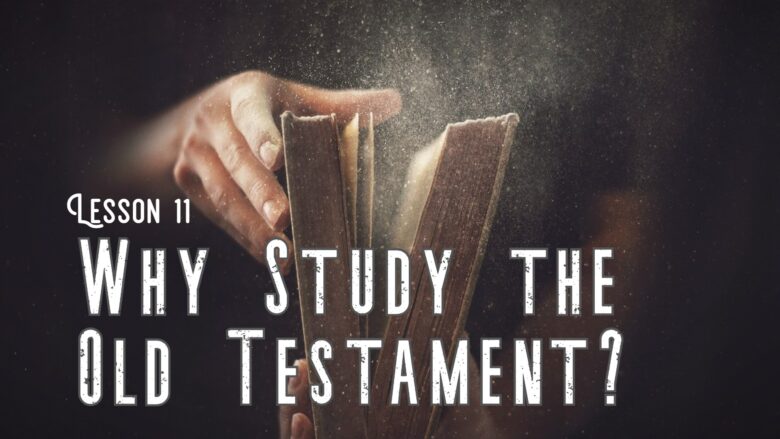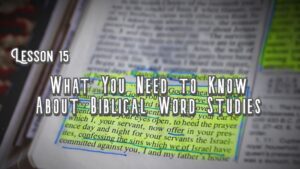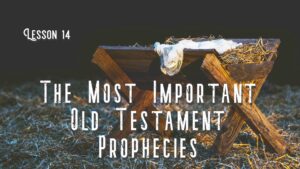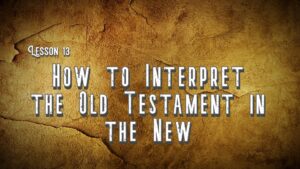This lesson takes a new trajectory of sorts. Starting now we begin to shift our focus on the Old Testament while still developing the Bible study tools already learned to this point. In this lesson we answer the question: why study the Old Testament?
The Old Testament (OT) is just as much the breath of God as the New Testament (NT). The OT lays foundation and precedent for the NT. If you can imagine watching the last episode of a TV series without seeing the first season, you can understand the absolute necessity of watching the OT premiere before seeing the NT grand finale. The OT establishes many things about the history of God and man. From the very beginning, Genesis makes it clear that God created man for the purpose of spreading the glory of God into all the earth (Gen. 1:27-28; Num. 14:21; Ps. 72:19; Isaiah 6:3; Habakkuk 2:14). However, with the introduction of sin into the world, the story of the Old Testament then becomes one of restoring the glory of God through the mystery of man’s redemption. How God will redeem man and restore His glory becomes progressively clearer as one reads the Old Testament. Moses, David, Isaiah, and all the prophets each peel away a layer of the onion, eventually revealing that a singular man will act as the world’s savior. When this savior will come is highly anticipated on every page. What will He look like? How will he accomplish this task? These questions and more are all previewed in the OT.
A full understanding of Jesus Christ requires the student of scripture to return to the OT. The very name “Christ” finds its origins in the OT. “Christ” is simply the Greek translation of the Hebrew word “Messiah” (Dan. 9:25) meaning “anointed one.” The Messiah’s deep OT roots lead James Smith to this conclusion in his book Introduction to Biblical Studies:
“No person can intelligently make the confession that Jesus is the Christ without some knowledge of Old Testament prophecies that predict the details of his life.” (118)
This may seem far-fetched if you have not spent much time in the Old Testament, but Smith’s conclusion is well in order. Lesson 14 will give further evidence to this opinion. B. W. Johnson calculated there to be a total of 855 OT quotations or references in the NT! There are many times the NT writers subtly reference the OT by using a singular word, phrase, or by some use of imagery. There is a good chance you have overlooked many of these quotations and references in your Bible reading. This information hopefully instills a desire to read the Old Testament just as much as the New.
Three Reasons People Do Not Study the Old Testament
There are more than three reasons people avoid the books that come before Matthew. Permit the list to be shorted to three, and pardon my straight shooting momentarily.
Reason 1– People do not know any better. Many congregational teachers and even preachers, whether naive or otherwise, start their audiences off with a disadvantage by the way they treat the OT. The OT is treated as if it is good for nothing more than a helpful illustration book of anecdotes and stories. Romans 15:4 is a passage that often gets abused as a justification for this effort. There Paul says, “For whatever things were written before were written for our learning…” While the OT certainly provides good illustrations for application, the OT was not written for this express purpose.
Reason 2– People can be straight up lazy when it comes to Bible study. According to Peter Rodgers, “The level of literacy was estimated to be at least 20%, and was probably closer to 10%, of the population in the Greco-Roman world of the first century,” (Rodgers 82). With practically every church member in America being literate and owning 2-3 Bibles, you would expect a greater degree of Bible knowledge. Unfortunately, this is not the case. Even though the literacy rate was low in Jesus’ day, those first century Jews converted to Christianity were used to sitting in the synagogue every Sabbath and listening for hours to the OT being read and taught aloud (Acts 13:13-15; 15:21; 17:1-3). Language literacy versus Bible literacy are two different things. The comparison and contrast between 1st century Bible literacy and 21st century Bible illiteracy is disturbing. Making things worse: most congregational teachers have not read the Bible completely through in their lifetime. I say this, not making assumptions, but based on asking several teachers while traveling from place to place. Again, some may be naive. That is excusable to a degree. But if you have been made aware of the importance of Bible reading and are still negligent, start reading or stop teaching. A person cannot teach what they do not know, and teaching is too great a responsibility to treat indifferently (James 3:1). The congregation is only as great as its leaders.
Reason 3- Those people that may be seeking a greater understanding of their OT and NT often do not know where to start. This is the very reason I created Five Minute Bible Study. Hopefully, between this workbook and other resources made available, a solid starting foundation is in place.
Where to Start
Start reading your Bible through on a regular basis. Start reading to your children on a regular basis. Start Genesis every January and end in Revelation every December. This is not as difficult as it seems if you make a commitment and have accountability. Eventually, this will become second nature. I am so thankful for my father integrating annual, family Bible reading into the daily routine since before I was born. You owe it to yourself, and you owe it to your children even more. Also, consider the Five Minute Bible Study series, What You Need to Know About the Old Testament. Stop making excuses and start today.
Homework Questions
1. True or False:
You do not need to spend much time reading and studying the Old Testament, because we are not bound by this scripture today.
2. In your own words, how would you sum up the story of the Bible in one to two sentences?
3. Have you read your Old Testament all the way through? If not, in the space provided below, write down a date. This date will be your personal goal for completing the Old Testament.



